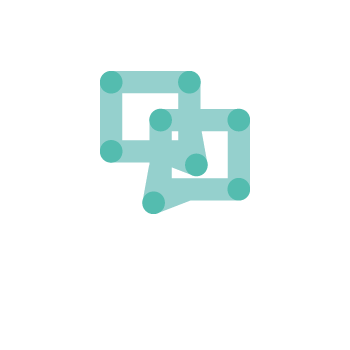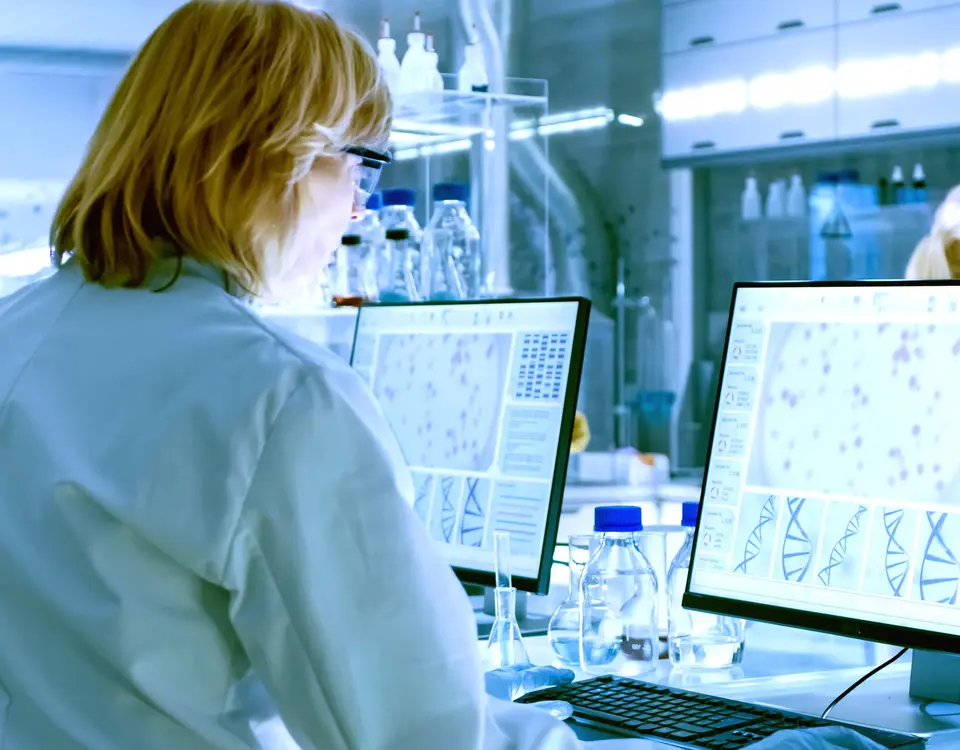About the project
The COVID-19 pandemic has demonstrated the important role of genomic characterisation of pathogens for pandemic management, infection prevention and control and individual patient care. It provides insights into the biology, evolution and transmission of infectious pathogens and improves the perception of transmissions, transmission chains, clusters and outbreaks; it contributes to the prevention of nosocomial infections, i.e. infections acquired in the context of medical treatment.
In contrast to the Netherlands and the UK, for example, the use of genomic pathogen surveillance in Germany is still in its infancy. Within GenSurv, an infrastructure for genomic pathogen surveillance is therefore to be established in Germany in cooperation with the RKI.
The most important facts at a glance
Our vision
We monitor the evolution and spread of bacterial and viral pathogens in Germany and thus contribute to protecting the population from infectious diseases. In close cooperation with the Robert Koch-Institute, GenSurv strengthens the capacity of relevant stakeholders to act in endemic, epidemic, pandemic and outbreak situations and combines the expertise of university medicine, science and the public health service. We support political decision-making processes and the public by providing relevant information and analyses.
Whole genome sequencing can break down the genetic repertoire of infectious agents with maximum resolution (i.e. at the level of individual nucleotides) and thus reveal, for example, the genetic basis of increased transmissibility, disease potential or drug resistance; it can provide crucial information for diagnosis, therapy and the development of vaccines, provide insights into the phylogenetic history of pathogens and - in combination with outreach epidemiology - map transmission dynamics in geographical and temporal dimensions.
However, the effective use of pathogen sequencing depends on a number of factors, including
- the availability and use of suitable sampling strategies
- the downstream utilisation of data
- integration with phenotypic characterisation (characterisation of all features of an organism)
- a collaborative, coordinated and networked approach including standardisation
standardisation.
For these factors, efficient, effective and sustainable solutions are provided within the framework of GenSurv and in close interaction with the Robert Koch-Institute.
Together with the Robert Koch-Institute and with the involvement of other experts, we are developing a national network for genomic pathogen surveillance in which we efficiently bring together, evaluate and (further) develop strategies, technologies and expertise relevant to surveillance and make them available for joint use. In particular, this includes strategies for the selection and sampling of relevant infectious agents, the establishment of a data infrastructure for the storage and analysis of infectious agent sequencing data and the linking of this data with selected information on the behaviour of the pathogen and the context in which the infection occurred. This combined infrastructure is designed to be scalable and internationally compatible. In addition, communication tools and an information platform to promote interaction and knowledge exchange between the relevant stakeholders are being developed. Our infrastructure is based on cross-institutional, cross-sector, cross-professional and supra-regional cooperation in a spirit of trust. We co-operate with other infrastructures and initiatives within and outside the Network of University Medicine. The principles of openness, collaboration, quality assurance and efficiency in accordance with the FAIR principles form the basis of our work.
During the GenSurv programme to date, important progress has already been made in establishing a national, coordinated and adaptively scalable network for genomic surveillance in Germany.
The main technical components of the GenSurv infrastructure are online. These include the CoGDat data hub and MicroReact-based visual analyses of the virus strains circulating in Germany, tools for analysing their ancestry and statistical analysis results. In addition, infrastructure interfaces are provided for the health authorities. These interfaces can be used to characterise the change in SARS-CoV-2 genomes at the level of individual mutations over time and to formulate hypotheses about chains of infection (doi: 10.1093/cid/ciab588, doi: 10.2807/1560-7917.ES.2022.27.43.2101089). In addition, raw data from participating university hospitals or private laboratories can now be uploaded.
An expert workshop laid the foundation for a strategy to establish genomic pathogen surveillance in Germany. This has resulted in a permanent expert committee consisting of experts from the Robert Koch-Institute and other institutions and organisations from the fields of bioinformatics, genomics, microbiology, virology, hygiene, infectiology, infection prevention and control, epidemiology and the public health service, including heads of national reference centres and consiliary laboratories. A white paper was jointly written and submitted to the Federal Ministry of Health (BMG) and the Federal Ministry of Education and Research (BMBF). Two scientific position papers were also published (https://rdcu.be/diwIF, rdcu.be/diwIH). The publications emphasise the need to establish a network for genomic pathogen surveillance in Germany for pandemic and inter-pandemic periods. They outline proposals for the establishment of an efficient, adaptable and responsive network, taking into account external framework conditions and internal standards. These will be further developed in the next step as part of a joint symposium organised by GenSurv and the Robert Koch-Institute with the aforementioned experts and a wider circle of stakeholders from politics, science, public health and professional associations.
GenSurv is thus making a decisive contribution to an infrastructure that is indispensable for the successful monitoring of infectious pathogens and the corresponding development of measures in pandemic and inter-pandemic times.
Latest news
Highlights

Perspective paper on the establishment of genomic pathogen surveillance in Germany published in the journal Infection
On 2 May 2023, an article based on the position paper on establishing a network for genomic pathogen surveillance (GES) was published in the English-language journal Infection. An appeal for strengthening genomic pathogen surveillance to improve pandemic preparedness and infection prevention: the German perspective is the result of collaboration between experts from GenSurv, the Robert Koch-Institute (RKI) and other institutions and organisations in bioinformatics, genomics, microbiology, virology, infectiology, hygiene and infection prevention, epidemiology and the public health service, including heads of reference and consiliary laboratories.
The article focusses on best practices and lessons learned from the United Kingdom and the Netherlands and transfers these to Germany.

Position paper on the establishment of genomic pathogen surveillance in Germany published in the Bundesgesundheitsblatt
A position paper on the establishment of genomic pathogen surveillance (GES) was published in the Bundesgesundheitsblatt on 22 February 2023. It is the result of a collaboration between experts from GenSurv, the Robert Koch-Institute (RKI) and other institutions and organisations from the fields of bioinformatics, genomics, microbiology, virology, infectiology, hygiene and infection prevention, epidemiology and the public health service, including heads of reference and consiliary laboratories.
The aim of this paper is to highlight the urgency and outline proposals for establishing an efficient, adaptable and responsive GES network, taking into account external framework conditions and internal standards. The proposals developed are based on global and country-specific best practices and strategy papers. The concrete next steps for realising an integrated GES include enabling the linking of epidemiological data with pathogen genome data, the joint and coordinated use of existing resources, the utilisation of the resulting surveillance data for relevant decision-makers, the public health service and the scientific community as well as the involvement of all stakeholders. The establishment of a GES network is essential for the continuous, stable, active surveillance of infection events in Germany, both during and outside of pandemic phases.

Successful application of genomic pathogen surveillance in Düsseldorf to track SARS-CoV-2 transmission chains in the population
As part of GenSurv and MolTrax, the successful application of integrated genomic surveillance in Düsseldorf to track SARS-CoV-2 transmission chains in the population and to detect and investigate travel-associated SARS-CoV-2 infection clusters was demonstrated. An article on this was published in the journal Eurosurveillance at the end of October 2022.
"Where do people actually get infected?" Düsseldorf researchers active in the Network University Medicine (NUM) have been trying to answer this question since the beginning of the coronavirus pandemic using modern methods of genomic epidemiology. In a recent publication, the scientists now show that the Düsseldorf system of "integrated genomic surveillance" they have developed actually makes it possible to trace infection chains in the population - and thus allows conclusions to be drawn, for example, about the role of travellers returning to the country in the infection process. Reliable data on the spread of pathogens in the population is not only of scientific interest, but also highly relevant for infection prevention - i.e. the prevention of infections, e.g. through targeted countermeasures. In the Düsseldorf system, modern genomic methods are combined with classic epidemiology and contact tracing data from the Düsseldorf public health department in order to better understand infection chains.

Expert workshop on the future of genomic pathogen surveillance in Germany
On 6 July and 7 July 2022, a joint workshop of GenSurv and the Robert Koch-Institute (RKI) took place in Berlin. Participants were experts from GenSurv and the RKI as well as from other institutions and organisations in bioinformatics, genomics, microbiology, virology, infectiology, hygiene and infection prevention, epidemiology and the public health service, including heads of reference and consiliary laboratories. During the two days, the basis for a joint strategy for genomic pathogen surveillance in Germany was laid. A white paper was jointly drafted and submitted to the Federal Ministry of Health (BMG) and the Federal Ministry of Education and Research (BMBF).






